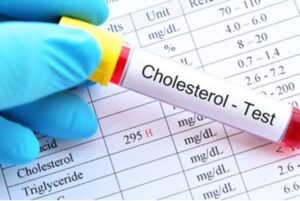
To uncover the truth about dyslipidemia, we must first know what is, often referred to as high cholesterol, dyslipidemia is the imbalance of lipid or fat found in your bloodstream. While moderate lipid levels in your body are okay, high levels can put you at higher risk for other medical health concerns. Read on for more information on dyslipidemia and how it affects your liver health.
There are three prime types of lipids found in your blood:
- High-density lipoproteins (HDL) – are considered the “good” cholesterol because their primary function is to remove LDL from your bloodstream and redirect it to your liver. This works because once LDL returns to the liver, cholesterol is crushed down and passed from the body.
- Low-density lipoproteins (LDL) – are known as the “bad” cholesterol due to their creation in your arteries of a waxy layer referred to as plaque. The accumulation of plaque is dangerous; it can make the arteries stiffer but can also obstruct the arteries allowing less blood to flow.
- Triglycerides – play a part by storing fat in your cells so that you may use them as a source of energy. They develop when calories are stored in fat cells rather than burned immediately.
If not monitored and controlled, dyslipidemia can be severe. If high cholesterol is left untreated, you allow plaque buildup in your blood vessels. This may result in health complications such as cardiovascular disease.

Can Dyslipidemia Affect Liver Health?
The short answer is yes! Your liver produces cholesterol and transfers it to the parts of your body where it’s needed. However, it becomes more complicated when cholesterol levels are too high. The build-up of excess fat can cause damage to the liver. The liver is vital to the management of cholesterol in your body. Thus, changes in lipids can play a fundamental role in chronic liver diseases, such as:
- Alcoholic and Non-Alcoholic Liver Disease
- Hepatitis B
- Hepatitis C
- Cholestatic Liver Disease
- Cirrhosis
Dyslipidemia is strongly associated with non-alcoholic liver disease based on recent study findings.
Symptoms and Treatment
Unless severe, minor dyslipidemia is challenging to detect since symptoms are relatively unseen. Most frequently, it is found via blood work or when testing for a different condition. Implementing lifestyle adjustments such as routine exercise and the reduction of unhealthy fats can have positive outcomes on those learning to best manage their dyslipidemia.
More severe symptoms of dyslipidemia can include chest pains, dizziness, difficulty breathing, heart palpitations, and swelling of the ankles or feet. When it comes to treatment, a healthcare professional will target lowering the levels of triglycerides and LDL. Treatment will vary depending on the severity of dyslipidemia and the underlying causes found.

Here at Arizona Liver Health, we offer a FREE fibroscan for those who worry they are at risk for liver disease. Prioritize your liver health and follow this link to set up your appointment today!
For interest in dyslipidemia or any future studies, learn more on our website here.


